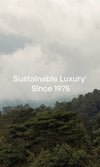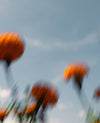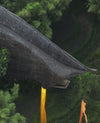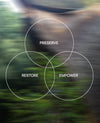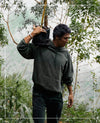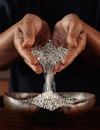
To avoid the harmful environmental impacts of mining, our jewelry is made with 100% reclaimed silver and gold that has been melted down and given new life.
Excess precious metal scraps generated during production are recycled and reincorporated into future pieces.
To avoid the harmful environmental impacts of mining, our jewelry is made with 100% reclaimed silver and gold that has been melted down and given new life.
Excess precious metal scraps generated during production are recycled and reincorporated into future pieces.
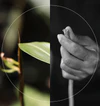
Our circular process means nothing usable is wasted. Less than 1% of our materials find their way to a landfill.
Our circular process means nothing usable is wasted. Less than 1% of our materials find their way to a landfill.
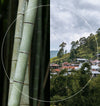
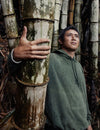
“Bamboo is this giant, magic grass that stitches up the landscape. When you plant bamboo, you bring back the water and suck up the carbon dioxide. You’re also planting a livelihood for that community—an annual harvest that can be sold as a sustainable alternative to timber, concrete, steel, plastic. You’re providing an economic backbone for rural villages.”
—Arief Rabik, Executive Director, Bamboo Village Trust
“Bamboo is this giant, magic grass that stitches up the landscape. When you plant bamboo, you bring back the water and suck up the carbon dioxide. You’re also planting a livelihood for that community—an annual harvest that can be sold as a sustainable alternative to timber, concrete, steel, plastic. You’re providing an economic backbone for rural villages.”
—Arief Rabik, Executive Director, Bamboo Village Trust
